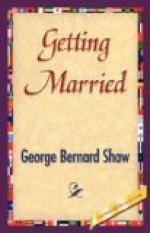When the great protest of the XVI century came, and the Church was reformed in several countries, the Reformation was so largely a rebellion against sacerdotalism that marriage was very nearly excommunicated again: our modern civil marriage, round which so many fierce controversies and political conflicts have raged, would have been thoroughly approved of by Calvin, and hailed with relief by Luther. But the instinctive doctrine that there is something holy and mystic in sex, a doctrine which many of us now easily dissociate from any priestly ceremony, but which in those days seemed to all who felt it to need a ritual affirmation, could not be thrown on the scrap-heap with the sale of Indulgences and the like; and so the Reformation left marriage where it was: a curious mixture of commercial sex slavery, early Christian sex abhorrence, and later Christian sex sanctification.
OTHELLO AND DESDEMONA
How strong was the feeling that a husband or a wife is an article of property, greatly depreciated in value at second-hand, and not to be used or touched by any person but the proprietor, may be learnt from Shakespear. His most infatuated and passionate lovers are Antony and Othello; yet both of them betray the commercial and proprietary instinct the moment they lose their tempers. “I found you,” says Antony, reproaching Cleopatra, “as a morsel cold upon dead Caesar’s trencher.” Othello’s worst agony is the thought of “keeping a corner in the thing he loves for others’ uses.” But this is not what a man feels about the thing he loves, but about the thing he owns. I never understood the full significance of Othello’s outburst until I one day heard a lady, in the course of a private discussion as to the feasibility of “group marriage,” say with cold disgust that she would as soon think of lending her toothbrush to another woman as her husband. The sense of outraged manhood with which I felt myself and all other husbands thus reduced to the rank of a toilet appliance gave me a very unpleasant taste of what Desdemona might have felt had she overheard Othello’s outburst. I was so dumfounded that I had not the presence of mind to ask the lady whether she insisted on having a doctor, a nurse, a dentist, and even a priest and solicitor all to herself as well. But I had too often heard men speak of women as if they were mere personal conveniences to feel surprised that exactly the same view is held, only more fastidiously, by women.




